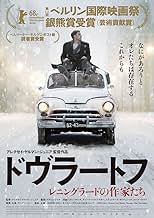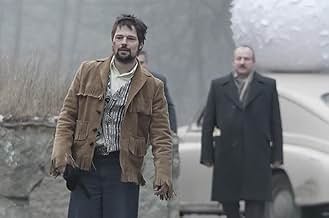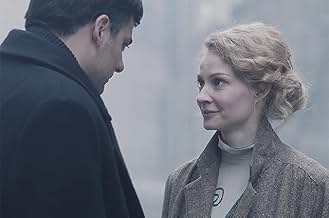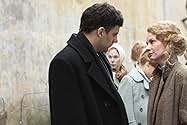IMDb RATING
6.4/10
2.3K
YOUR RATING
The film actions unfold in 1971, telling about the four days of life of famous writer Sergei Dovlatov. The film raises the eternal issue of the Russian and European culture - the issue of mo... Read allThe film actions unfold in 1971, telling about the four days of life of famous writer Sergei Dovlatov. The film raises the eternal issue of the Russian and European culture - the issue of moral choice.The film actions unfold in 1971, telling about the four days of life of famous writer Sergei Dovlatov. The film raises the eternal issue of the Russian and European culture - the issue of moral choice.
- Director
- Writers
- Stars
- Awards
- 5 wins & 11 nominations total
Danila Kozlovsky
- David
- (as Danila Kozlovskiy)
Tamar Hovhannisyan
- Nora Dovlatova - Sergei Dovlatov mother
- (as Tamara Oganesyan)
Anna Yekaterininskaya
- Deputy director of the plant
- (as Anna Ekaterininskaya)
Sergei Tolstov
- Factory Newspaper Editor
- (as Sergey Tolstov)
Maria Järvenhelmi
- Finnish tourist
- (as Mari Yarvinkhelmi)
Nikolai Shatokhin
- Dovlatov's friend
- (as Nikolay Shatokhin)
- Director
- Writers
- All cast & crew
- Production, box office & more at IMDbPro
Featured reviews
Dovlatov is a good biographical film about a famous Russian writer. The majority of biographical films are divided into 2 types: either the film tells the whole life of a person or in detail about some period of life. It is type 2 that I consider preferable, as in 2-2.5 hours of conditional timing it is difficult to lay down a whole life of a person. Dovlatov is just such a film, the action of the film unfolds in just a couple of days 1971. Transfer of an era, life and life of Leningrad of the 1970th years simply 10/10. One of the best films about the period of Brezhnev stagnation of society. Just a good film, in which there are only dialogues and internal conflict of the writer, who alone opposes the state structure.
10gokselll
What a good movie!!!
In this movie audience witnesses a week of Russian author Dovlatov's life. Panoramic view of those seven days shows interesting details of everyday lives of intellectuals and artists in the late period of USSR.
Within a plain but masterfully designed visual composition, with no agitative langue, the movie presents satirical sub-texts on pressure of state-bureaucratic principles on artistic production, degeneration of USSR administrative regime and confliction of factual-economical position of artist in life and existential and inherent artistic motivation etc...
Critics on state-art relation in this movie not only satire historical conditions in USSR but also compose a general and actual critical sense on relevant matters indicating negative picture of the ideal conditions.
Watching "Dovlatov" is a great cinematic pleasure, a great experience!
In this movie audience witnesses a week of Russian author Dovlatov's life. Panoramic view of those seven days shows interesting details of everyday lives of intellectuals and artists in the late period of USSR.
Within a plain but masterfully designed visual composition, with no agitative langue, the movie presents satirical sub-texts on pressure of state-bureaucratic principles on artistic production, degeneration of USSR administrative regime and confliction of factual-economical position of artist in life and existential and inherent artistic motivation etc...
Critics on state-art relation in this movie not only satire historical conditions in USSR but also compose a general and actual critical sense on relevant matters indicating negative picture of the ideal conditions.
Watching "Dovlatov" is a great cinematic pleasure, a great experience!
Maybe not the best. for Comunism. for Dovlatov. for the atmosphere of Soviet Union. the cause - the less courage/art/science of director to move the things out of superficial perspective. sure, for a Eastern public, it works. for the memories about period, for the lectures about it, maybe for the familiarity of Dovlatov and Brodsky writings. but it is not real enough . the good point - the work of Danila Kozlovsky. but this is not a surprise.
The female roles in this film were stereotypical, was there not even one talented female writer in their group in that time? The women are either in love, in awe or supportive, none of them has an authentic plan of their own, the only female remotely doing something artistic, the actrice, is a sell out. But the men on the other hand are all hero's standing their ground.. how pathetic to enforce these harmful and dishonest stereotypes..
Saw this at the Berlinale 2018, where it was part of the Competition for the Golden/Silver Bear. A lot of faces pass by, in crowded apartments or various other just as crowded places. Some of those faces will reappear several times. No need to remember all of them, apart from the main protagonist, his ex-wife and daughter of course, as there is no continuing story that brings you from A via B and C to Z.
The division in six days is also not really relevant. It gives you a clear marker, however, that the movie jumps to something completely different each time a date appears on screen. It provides for some structure albeit not crucially important.
There is room for humor, not too much as there is no happy ending (no spoiler: we know this writer was not recognized in his own country and emigrated later, and we also know his own country valued him not until after his death).
Be prepared for name dropping of several famous writers, most of whom I recognize vaguely by name, but have never read them in my life. Maybe you have better luck in fitting them in the context in which their name is mentioned, and judge the name dropping as appropriate or merely done out of pomposity (I assume the former, given the circles our main protagonist usually is in, where one surely knows these names and would protest immediately when improperly quoted).
Trick question: did this movie enlighten me about the period and Russian politics at the time?? No, I think not. But anyone who has read some of the writers who have been quoted, may think otherwise. Several reviewers mentioned that it was a time of a stand still.
What this movie makes abundantly clear, is that the regime does not allow frivolities with their policy, keeping a tight lease on all publications such as journals, magazines and books. It is something that all such regimes seem inclined to do as a matter of course. Is that only to close the ranks, out of fear that the communist dream is not so rosy as one is taught?? Or it is just to not endanger the positions of the current politicians?? I assume that all of the above applies. It seems to apply equally to contemporary dictatorial regimes (Turkey, Iran, and many others), a parallel observation that makes this movie more relevant than it intrinsiccally is when considering the Brezjnew period alone.
The division in six days is also not really relevant. It gives you a clear marker, however, that the movie jumps to something completely different each time a date appears on screen. It provides for some structure albeit not crucially important.
There is room for humor, not too much as there is no happy ending (no spoiler: we know this writer was not recognized in his own country and emigrated later, and we also know his own country valued him not until after his death).
Be prepared for name dropping of several famous writers, most of whom I recognize vaguely by name, but have never read them in my life. Maybe you have better luck in fitting them in the context in which their name is mentioned, and judge the name dropping as appropriate or merely done out of pomposity (I assume the former, given the circles our main protagonist usually is in, where one surely knows these names and would protest immediately when improperly quoted).
Trick question: did this movie enlighten me about the period and Russian politics at the time?? No, I think not. But anyone who has read some of the writers who have been quoted, may think otherwise. Several reviewers mentioned that it was a time of a stand still.
What this movie makes abundantly clear, is that the regime does not allow frivolities with their policy, keeping a tight lease on all publications such as journals, magazines and books. It is something that all such regimes seem inclined to do as a matter of course. Is that only to close the ranks, out of fear that the communist dream is not so rosy as one is taught?? Or it is just to not endanger the positions of the current politicians?? I assume that all of the above applies. It seems to apply equally to contemporary dictatorial regimes (Turkey, Iran, and many others), a parallel observation that makes this movie more relevant than it intrinsiccally is when considering the Brezjnew period alone.
Did you know
- ConnectionsFeatures Romantyczni (1970)
- How long is Dovlatov?Powered by Alexa
Details
Box office
- Gross worldwide
- $2,187,653
- Runtime
- 2h 6m(126 min)
Contribute to this page
Suggest an edit or add missing content

![Watch Trailer [OVS]](https://m.media-amazon.com/images/M/MV5BZjQ0ODcwYTMtZmU2OC00ZDFlLTkyZTgtY2Y0NDFjMjJmNmZlXkEyXkFqcGdeQXRyYW5zY29kZS13b3JrZmxvdw@@._V1_QL75_UX500_CR0)
































